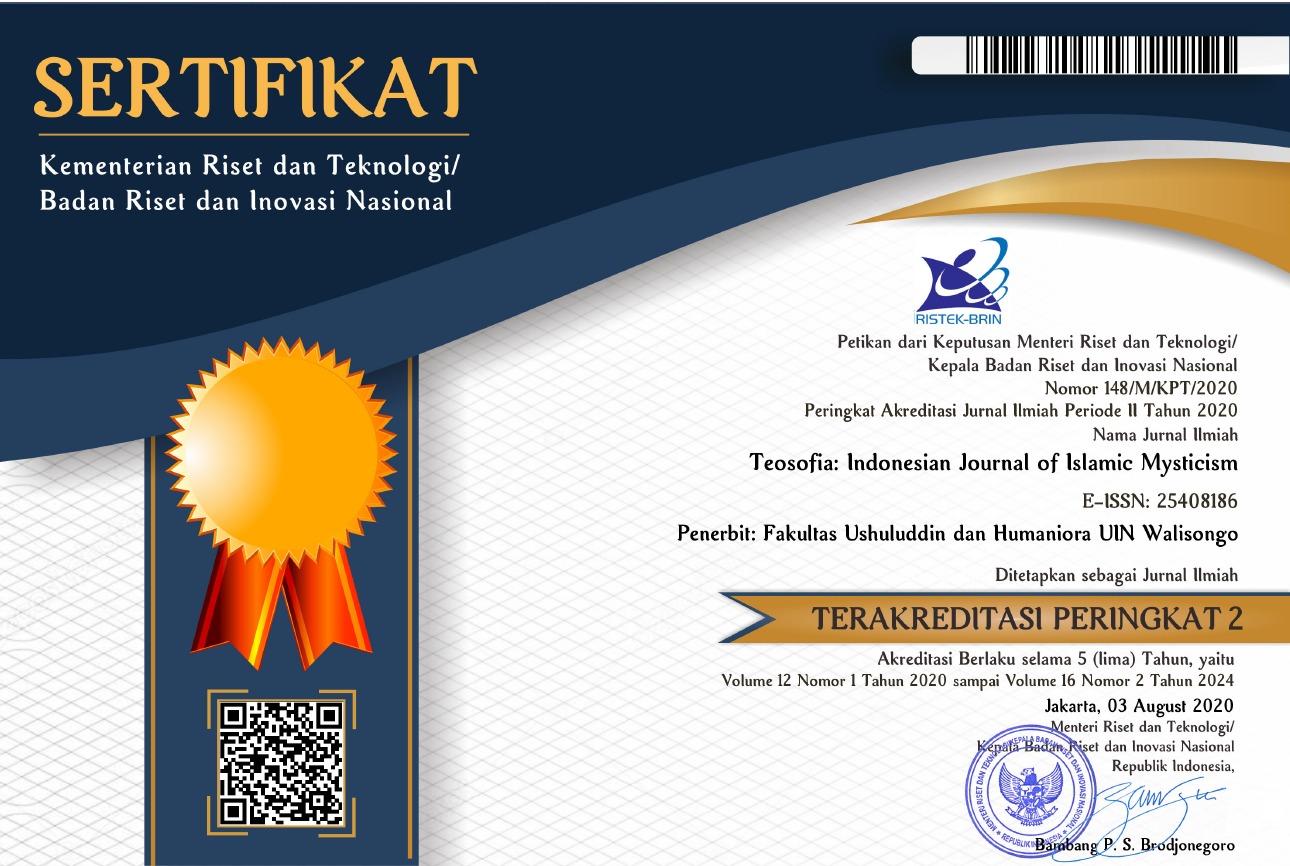The Spirituality of Music in The Light of al-Sarrāj and al-Hujwīrī
DOI:
https://doi.org/10.21580/tos.v6i2.3407Keywords:
spirituality of music, al-Sarrāj, al-Ḥujwīrī, al-Luma’, Kashfu al-MaḥjūbAbstract
This paper discusses spiritual and fiqh (Islamic Jurisprudence) aspects of music in relation to two classical Sufi masters i.e, Abū Naṣr al-Sarrāj al-Ṭūsi (378/988) and Alī b. Uthmān al-Jullabi al-Ḥujwīrī (465/1072). It particularly focuses on their two masterpieces i.e., Kitāb al-Luma’ and Kashfu al-Maḥjūb. It further compares three specific points; permissibility of music, listening to Quran and poetry and the state of ecstasy in auditing music. Based on this study, it is found that the Sufi Masters observed the matter of spirituality can be combined and approached with strict obedience through rigidly practicing fiqh. Yet, it should be noted that spirituality of music will be of course beyond dicta of jurisprudence by the fact that spirituality is inward thing while shari’ah (which is narrowly used to point religious law) is outward one. As to the matter of listening to Quran and poetry, both sufi masters offer more emphasis on listening Qur’an than poetry or odes. Nevertheless, they did not negate the importance of listening to poetry, poems and odes. It is evidenced by a ḥadīth stating that indeed there is wisdom in every poetry. In terms of the state of ecstasy, the two masters offer tawājud (artificial wajd). Tawājud is aimed to gain wajd by representing to one’s mind the bounties and evidences of God, and thinking of union (ittiḥād) and wishing for the practices of Muslim saints.
Downloads
References
Aṭṭār, Farīdal-Dīn, and A. J. Arberry. Muslim Saints and Mystics: Episodes from the Tadhkirat Al-Auliyaʼ ("Memorial of the Saints"). Boston: Routledge & Kegan Paul, 1979.
Dabashi, Hamid. “Historical conditions of Persian Sufism during the Seljuk Period” in The Heritage of SufismVolume I. Leonard Lewishon, ed. One World Publications: Oxford, 1999.
al-Faruqi, L.L. Islam and Art. National Hijra Council: Islamabad, 1985.
Fujii, Chiaki. Ritual Activities of Tariqas in Zanzibar. African Study Monographs, 2010.
Ḥujwīrī, ʻAlī ibn ʻUthmān. Kashf al-Maḥjūb. Revelation of the Mystery. Translated by Reynold Alleyne Nicholson. Accord, NY: Pir, 1999.
http://www.britannica.com/EBchecked/topic/520198/sama (Accessed on March 30)
Lewishon. Leonard, “The Sacred Music of Islam: Sama‘ in the Persian Sufi tradition” in British Journal of Ethnomusicology, Vol. 6, British Forum for Ethnomusicology, 1997.
Michon, Jean-Louis. “Sacred music and dance in Islam”. In World Spirituality Volume XX, Edited by. SeyyedHossein Nasr, The Crossroad Publising Company: New York, 1991.
Mubarok.Muhammad Zaki, Al-Taṣawwuf al-Islāmi, Chapter II. Dār al-Jayl: Beirut Lebanon.
Nasr, SeyyedHossein. “Sufism and Spirituality in Persia” In World Spirituality Volume XX, Edited by Seyyed Hossein Nasr, The Crossroad Publishing Company: New York, 1991.
Nasr, Seyyed Hossein. The Garden of Truth, The Vision and Promise of Sufism, Islam’s Mystical Tradition. HarperCollins Publishers: New York, n.d.
Rouget, Gilbert. Music and Trance: A Theory of the Relations between Music and Possession [1980 French original]. Chicago: University of Chicago Press, 1985.
Sarrāj, AbūNaṣr. Kitab Al-Luma 'fi'l-Taṣawwuf. Edited for the First Time, with Critical Notes, Abstract of Contents, Glossary, and Indices by Reynold Alleyne Nicholson, and Printed for the Trustees of the "E. J.W. Gibb Memorial."Leyden, London: E.J. Brill/ Luzac& Co, 1914.
Shiloah, Amnon. Music in the World of Islam: A Socio-Cultural Study. London: Scholar Press, 1995.
Suvorova, Anna. Muslim Saints of South Asia. Routledge: New York, 2005
Downloads
Published
How to Cite
Issue
Section
License
Copyright
The copyright of the received article shall be assigned to the journal as the publisher of the journal. The intended copyright includes the right to publish the article in various forms (including reprints). The journal maintains the publishing rights to the published articles. Therefore, the author must submit a statement of the Copyright Transfer Agreement.*)
Licensing

This work is licensed under a Creative Commons Attribution-ShareAlike 4.0 International License.
In line with the license, authors are allowed to share and adapt the material. In addition, the material must be given appropriate credit, provided with a link to the license, and indicated if changes were made. If authors remix, transform or build upon the material, authors must distribute their contributions under the same license as the original.
_______
*) Authors whose articles are accepted for publication will receive confirmation via email and send a Copyright Transfer Agreement.









